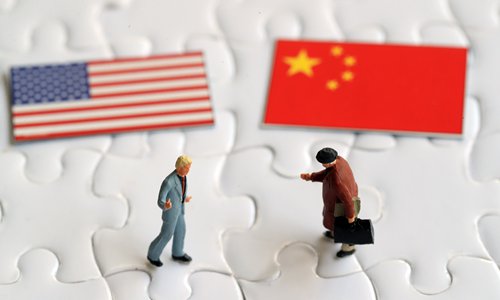HOME >> OPINION
US and the hierarchy of civilizations
By Ding Gang Source:Global Times Published: 2019/6/12 22:33:40

Photo: IC
In 1876, the US Congress had a debate on the Chinese immigrants. One side thought the Chinese immigrants should be expelled from the US while the other side believed they needed to be "tamed" in keeping with God's request. They were united by the common refrain - Chinese are an inferior race. What divided them was the approach to this Asian people - whether the Chinese immigrants should be shunned or assimilated by an attempt to change them.Those in favor of reining in the race believed that God had sent the Chinese to learn the US way of life, religion as well as virtues.
During later interaction between Americans and Chinese, the controversy has never settled with both sides alternately gaining the upper hand. The role of religion in the process seemed to be vanishing, but the hierarchy created by it never changed.
This is consistent with the spiritual pursuits of Americans. In Josiah Strong's 1885 book Our Country, he argued that elites of the Anglo-Saxon race had congregated in the US. He believed that Anglo-Saxons are a superior race endowed by God the mission to conquer the world.
There have been quite a number of Americans with this hierarchical mindset. In the 1930s, about 3,000 Western missionaries came to China; half of them were from the US. They not only introduced Christianity and democratic politics to China but also told Americans back home what China was like. These missionaries laid the basis for the formation of China's image in US culture.
In the book America's Response to China: A History of Sino-American Relations, US scholar Warren I. Cohen says, "They cherished not China, but the opportunities China gave them - opportunities to reform that 'benighted' country, to fulfill their Christian missions, or to make profits."
Swiss psychologist Carl Gustav Jung coined the term "collective unconscious," which means long-term accumulation of historic and traditional factors would create a collective experience among each nationality, descendants of which will take the same approach as their ancestors to understand the world and make responses. That being said, has the spirit of expansion become rooted in the subconscious mind of Americans over the past 100 years?
If you invite Chinese people who have lived in the US for a long time to talk about their impression of Americans, they will dish out the same answer - Americans are proud. Americans have heard so many times since childhood that they are the best. Each parent will hammer into their children's head the belief that they are No.1, creating an American superiority complex.
Americans are not difficult to get along with. They are enthusiastic, compassionate and ready to help. If you are lost or your car breaks down, you can always find good people around willing to lend a helping hand. My friends once took me to a church and I found Americans there donating money for out-of-school children in China. But if one stays with Americans long enough, he or she would gradually feel that many of them do not consider yellow-skinned Chinese equal to themselves.
Quite a few Chinese, who went to the US for further education about 30 years ago, found out that Americans would not discriminate against them even though they had little money in their pockets. They would even be kind to help until those overseas Chinese students finished their studies. But today, facing Chinese students, who spend tens of thousands of dollars to study in the US, Americans hardly have the same sympathy. The way Chinese see Americans is changing and vice-versa. But the entrenched national mind-set of Americans is hard to change.
Since Empress of China, the first US merchant ship to enter Chinese waters in 1784, interactions between China and the US have lasted for over 200 years. However, when the two sides sit at the negotiating table, Chinese people can still feel there is a hierarchy of civilizations, although China today is totally different from what it was 200 years ago.
The author is a senior editor with People's Daily, and currently a senior fellow with the Chongyang Institute for Financial Studies at Renmin University of China. dinggang@globaltimes.com.cn. Follow him on Twitter @dinggangchina
Posted in: COLUMNISTS,DING GANG,CRITICAL VOICES,ASIAN REVIEW